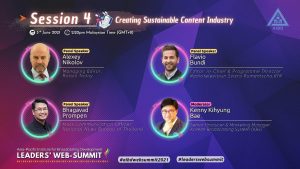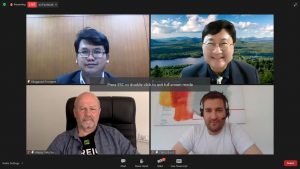By: Lee Lai Mee, Session Manager/CCO

The content industry was affected tremendously during the pandemic, leading to a void in the broadcasting organisation’s air-time and programme line-up. Mr Kenny Bae, Senior Producer and Marketing Manager, KBS, the moderator, felt the broadcaster and creative minds were in dire need to collaborate in hybrid content generation. He was joined by three speakers – Mr Alexey Nikolov, Managing Editor, Russia Today; Mr Flavio Bundi, Editor-in Chief and Programme Director, RTR; and Mr Bhagavad Prompen, Mass Communication Officer, NNT. They shared their experiences, perspective and insight into the scenario of how the content industry was impacted in their region, and to redefine what is sustainable content in the pandemic.
For Mr Alexey, sustainable content in the pandemic was news-based information but people were not fed with all the right information. In his presentation – ‘The Importance Of Access To Balance News And Alternative Information Sources’, he emphasized we must provide the correct information as the pandemic challenges human lives. He elaborated actual or impartial reporting is a human responsibility, and recommended all to consciously try to bring humanism in reporting. Therefore, to sustain the content industry in this social age and pandemic, he added, journalists in solidarity, needed to protect mainstream media as a reliable source of information.
The second speaker, Mr Flavio spoke of 3Cs- – Collaboration/ Cooperation, Community and Change as an Opportunity. Being a small public Service Broadcaster, the 3 Cs was the successful tool for RTR to remain relevance and influence its content production. He highlighted, besides the story, it was important to be close to the audience and to use all new forms and possibilities to produce sustainable content that made sense to the people. During the pandemic, RTR had intensified collaboration and cooperation by bringing art to homes and be a platform for school to go online and the community to contribute anything artistic. Digital transformation had created visibility and orientation for RTR.
Mr Bhavagad wished not to have a 24 hours COVID Channel in Thailand. He said Media needed to create alternative or new content for the people to be aware and be educated by them. He spoke on – Seeking Sustainable Topics For The Media Sector. He highlighted the media needed to know about audience’s demands in order to create framework for sustainable media production to take actions and then to repeatedly project the ideas to the people at grassroot level till media become a trusted source of information.
The rapporteur, Sayed Muhammad Ali, Senior Producer/Liaison Officer from Pakistan Television Corporation (PTV), in his summary remarked that sustainable content in the pandemic had taken a new perspective. He quoted Mr Alexey as one defining content as news-based information who highlighted the importance of keeping a human angle as the focus with the sense of equality when producing sustainable news content.
Ali concurred sustainable content, for Mr Flavio, was all about the story and the importance of closeness to the audience in the pandemic had led to digital transformation in RTR. Mr Flavio believed traditional media must master the digital tools to get a leading role in sustaining the content industry.
Whereas for Mr Bhagavad, seeking sustainable topics/content for the media was a continuous effort to achieve the well-defined goals in overcoming COVID-19 hard times. In doing so, the demand of the audience should always be a priority. He recommended the digital tools may be integrated as means of the traditional media as well to reach out to the masses.

Going Beyond What It Takes To Be Sustainable In The Pandemic
By: Lee Lai Mee, Session Manager/CCO The content industry was affected


